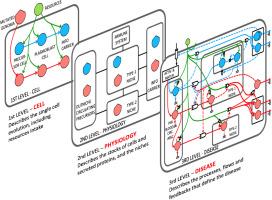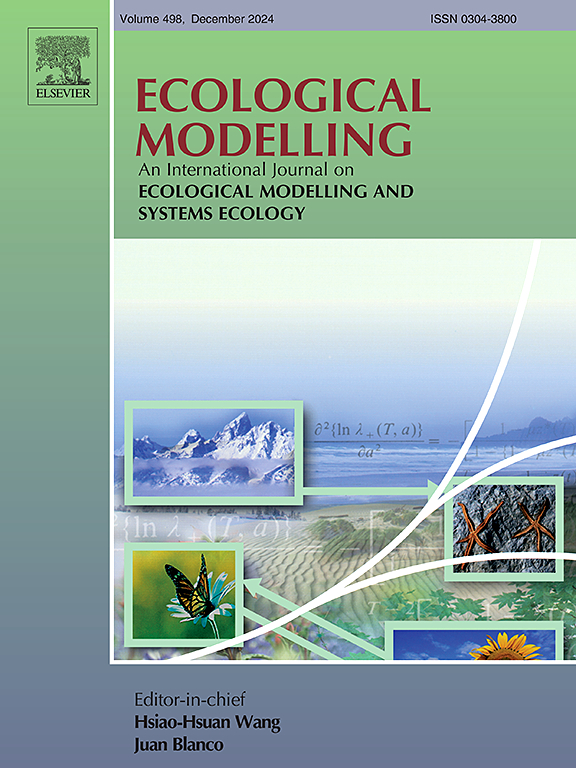迈向疾病的数字双胞胎:霍华德·t·奥达姆对癌症生物学和医学的遗产
IF 3.2
3区 环境科学与生态学
Q2 ECOLOGY
引用次数: 0
摘要
复杂的系统——比如生态系统——表现出非线性的、自组织的行为,超越了单个组成部分之间简单的因果关系:反馈网络的存在使得只有通过“放大”到更广阔的视角才能理解的反应和适应。在这方面,从一般系统理论和热力学出发,H.T. Odum在发展定量方法以理解这些基本关系的本质及其涌现特性的动态表示方面做出了持久的贡献。在他的工作成为新颖和有影响力的思想来源的所有领域(例如,生态学,能源,经济学)中,一种尚未得到充分探索的新可能性出现了,即应用能源系统语言来研究复杂的生物医学系统。在这一框架下,诸如无法治愈的癌症和自身免疫性疾病等复杂疾病作为系统性特征出现,表现出调节控制过程的故障以及细胞与其微环境之间的相互作用/串扰。我们提供了Odum遗产如何帮助解决这些恶性、复杂生态系统的复杂性的概念化,为疾病数字孪生的分析、动态表示奠定了基础,重点关注疾病类别在不同层次和时间尺度上的进化情景。最后,我们讨论了如何使用来自创新实验技术(小肿瘤生态系统)的数据为开发患者治疗和一般个人医疗保健的整体框架提供强大的工具。本文章由计算机程序翻译,如有差异,请以英文原文为准。

Towards a disease digital twin: Howard T. Odum's legacy for cancer biology and medicine
Complex systems – such as ecosystems – display non-linear, self-organizing behaviors that go beyond simple cause-effect relationships among individual components: the presence of feedback networks enables responses and adaptations that can only be understood by "zooming out" to wider perspectives. In this regard, moving from general systems theory and thermodynamics, H.T. Odum made lasting contributions in developing a quantitative approach for understanding the nature of these fundamental relationships and the dynamical representation of their emergent properties. Among all the realms in which his work was source of novel and influential ideas (e.g., ecology, energy, economics), a new possibility, still underexplored, appears applying the energy system language to study complex biomedical systems. In this framework, complex diseases such incurable cancers and as self-immune diseases arise as systemic features, manifesting the malfunctioning of regulatory control processes and the interactions/crosstalk between cells and their micro-environment. We provide a conceptualization of how Odum’s heritage can help to address the complexity of these malignant, complex ecosystem, laying the foundation for an analytical, dynamical representation of a Disease Digital-Twin, focusing on the evolutionary scenarios for classes of diseases, at different hierarchical and timescales. Finally, we discuss how using data coming from innovative experimental techniques (small Tumor Ecosystems) provides powerful tools for developing a holistic framework for patients’ treatment and general individual health care.
求助全文
通过发布文献求助,成功后即可免费获取论文全文。
去求助
来源期刊

Ecological Modelling
环境科学-生态学
CiteScore
5.60
自引率
6.50%
发文量
259
审稿时长
69 days
期刊介绍:
The journal is concerned with the use of mathematical models and systems analysis for the description of ecological processes and for the sustainable management of resources. Human activity and well-being are dependent on and integrated with the functioning of ecosystems and the services they provide. We aim to understand these basic ecosystem functions using mathematical and conceptual modelling, systems analysis, thermodynamics, computer simulations, and ecological theory. This leads to a preference for process-based models embedded in theory with explicit causative agents as opposed to strictly statistical or correlative descriptions. These modelling methods can be applied to a wide spectrum of issues ranging from basic ecology to human ecology to socio-ecological systems. The journal welcomes research articles, short communications, review articles, letters to the editor, book reviews, and other communications. The journal also supports the activities of the [International Society of Ecological Modelling (ISEM)](http://www.isemna.org/).
 求助内容:
求助内容: 应助结果提醒方式:
应助结果提醒方式:


